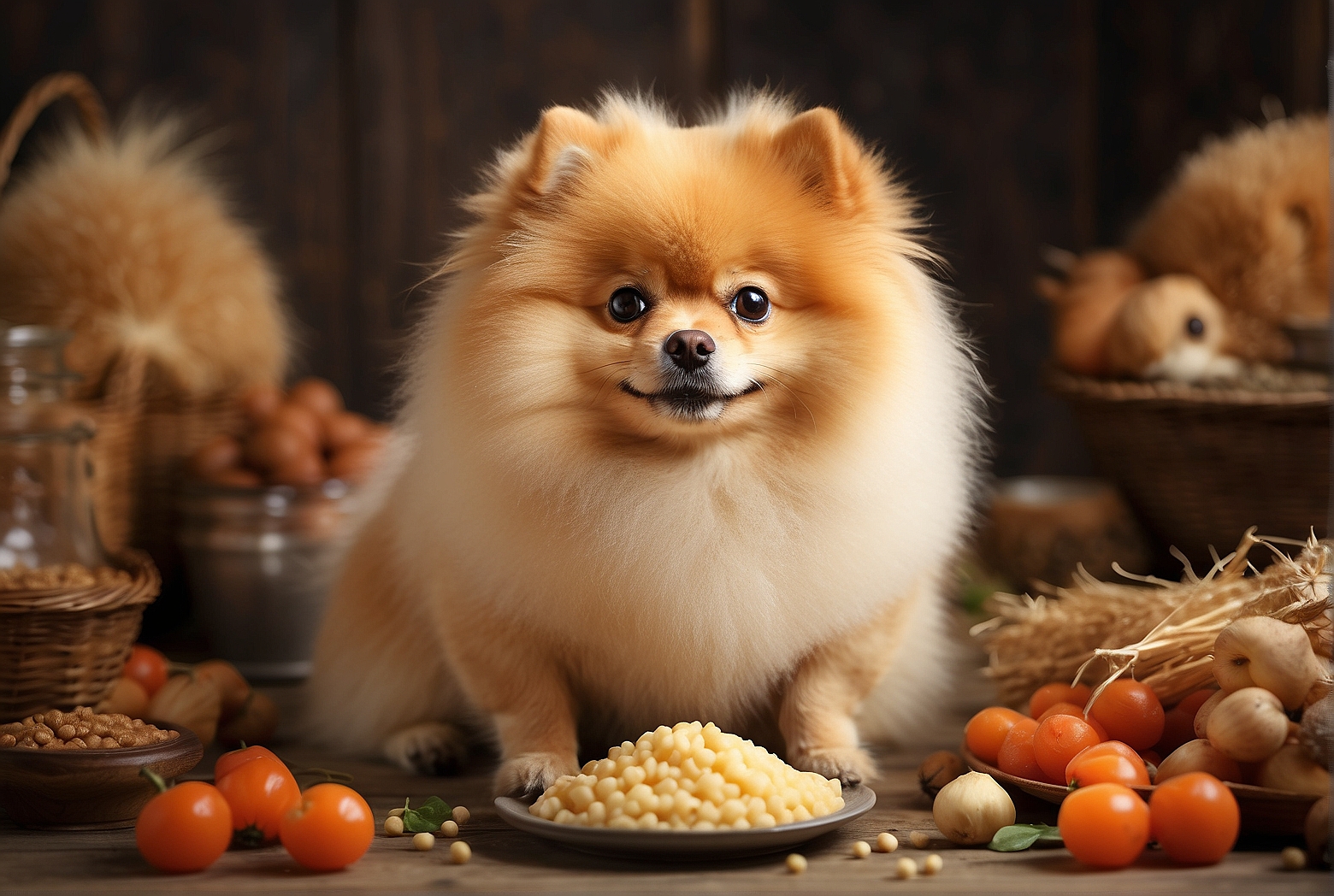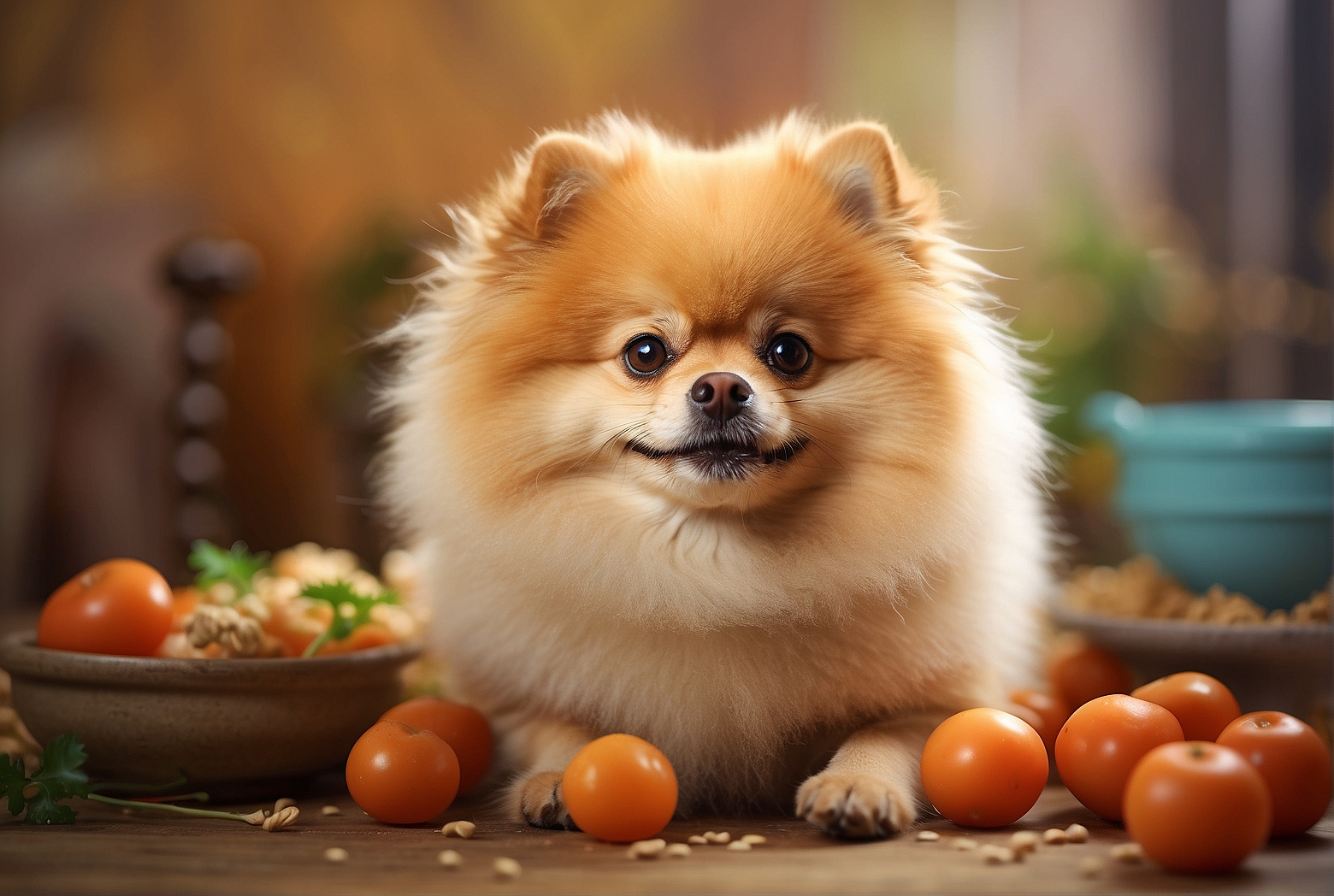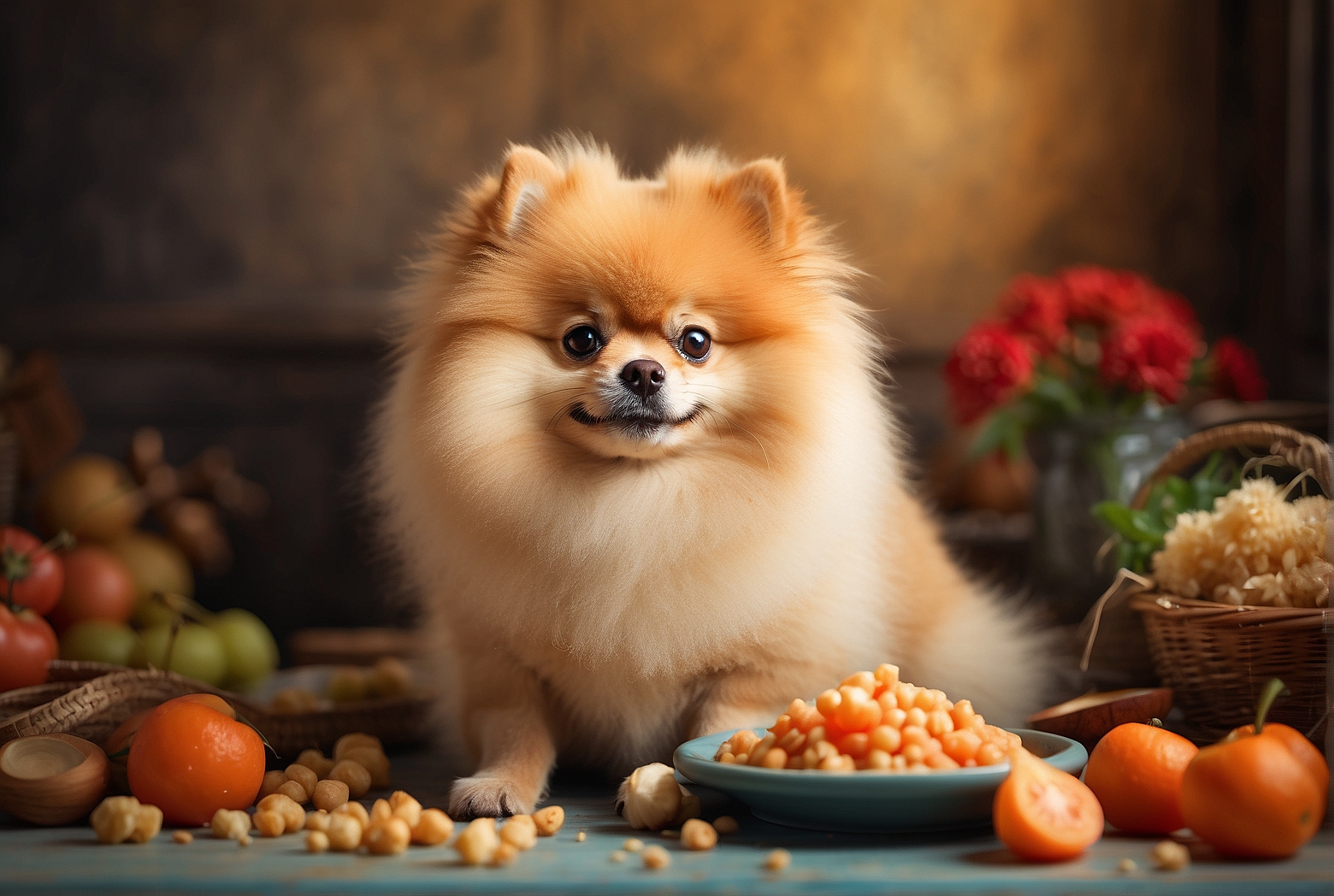Are you a proud owner of a senior Pomeranian? If so, then you know how important it is to provide your furry companion with the best nutrition to support their aging needs. In this article, we will explore the top senior Pomeranian foods, focusing on their specific dietary requirements and offering helpful suggestions for maintaining their overall health and vitality. So if you’re ready to give your fluffy friend the love and care they deserve, let’s dive into the world of nourishing options for your beloved senior Pomeranian.
Types of Senior Pomeranian Foods
Grain-Free Foods
Grain-free foods are a popular choice among senior Pomeranian owners. These foods are formulated without grains such as wheat, corn, or soy, which can be difficult for some dogs to digest. Grain-free options often use alternative sources of carbohydrates such as sweet potatoes or peas. These foods provide a nutrient-dense and easily digestible option for your senior Pomeranian.
Wet Foods
Wet foods, also known as canned foods, are another option to consider for your senior Pomeranian. These foods have a higher moisture content, which can be beneficial for dogs with dental issues or those who may not drink enough water. Wet foods often come in a variety of flavors and textures, providing a more appealing option for picky eaters.
Raw or Homemade Diets
Raw or homemade diets have gained popularity among senior Pomeranian owners who prefer a more natural approach to their dog’s nutrition. These diets typically consist of raw meat, bones, fruits, and vegetables. However, it is important to consult with a veterinarian or canine nutritionist before switching to a raw or homemade diet to ensure that your senior Pomeranian is receiving all the necessary nutrients in the correct proportions.
Limited-Ingredient Diets
Limited-ingredient diets are designed for dogs with food sensitivities or allergies. These diets typically contain a minimal number of ingredients, making it easier to identify and avoid potential allergens. Limited-ingredient diets can be a great option for senior Pomeranians who experience digestive issues or skin problems.
Factors to Consider When Choosing Senior Pomeranian Foods
Protein Content
Protein is an essential nutrient for senior Pomeranians, as it helps maintain muscle mass and supports overall health. When choosing a senior Pomeranian food, opt for options that contain high-quality animal-based proteins, such as chicken or fish. Aim for a minimum protein content of 25% in the food you select.

Fat Content
While fat sometimes gets a bad reputation, it is actually an important part of a senior Pomeranian’s diet. Fat provides essential fatty acids that support skin and coat health, as well as energy. Look for senior Pomeranian foods that contain healthy fats, such as salmon oil or flaxseed oil. Aim for a fat content of around 12-15% in the food you choose.
Calorie Density
As dogs age, their metabolism slows down, and they may require fewer calories to maintain a healthy weight. It’s important to select a senior Pomeranian food that is appropriately calorie-dense to prevent weight gain or obesity. Consult your veterinarian to determine the ideal daily calorie intake for your senior Pomeranian based on their age, weight, activity level, and overall health.
Ingredient Quality and Digestibility
The quality and digestibility of the ingredients in your senior Pomeranian’s food are crucial factors to consider. Opt for foods that prioritize high-quality ingredients and are free from artificial additives, fillers, or by-products. Look for easily digestible ingredients such as whole grains, lean proteins, and fruits and vegetables.
Added Supplements and Joint Support
Senior Pomeranians may benefit from foods that contain added supplements to support joint health. Look for ingredients such as glucosamine and chondroitin, which can help alleviate joint stiffness and discomfort commonly experienced by older dogs. These supplements can aid in maintaining your senior Pomeranian’s mobility and overall quality of life.
Recommended Senior Pomeranian Foods
Royal Canin Pomeranian Breed Health Nutrition
Royal Canin Pomeranian Breed Health Nutrition is specifically formulated for the unique nutritional needs of Pomeranians. This senior dog food contains a combination of antioxidants, vitamins, and minerals to support your Pomeranian’s immune system and promote healthy aging. It also features a tailored kibble shape designed to encourage chewing and improve dental health.
Merrick Grain-Free Senior Dry Dog Food
Merrick Grain-Free Senior Dry Dog Food is an excellent choice for senior Pomeranians who need a grain-free diet. It features real deboned chicken as the number one ingredient and is packed with high-quality protein to support muscle maintenance. This senior dog food also contains glucosamine and chondroitin for joint support, as well as omega-3 and omega-6 fatty acids for a healthy skin and coat.

Wellness Complete Health Natural Dry Senior Dog Food
Wellness Complete Health Natural Dry Senior Dog Food is a nutritious and balanced option for senior Pomeranians. It is made with real deboned chicken and a blend of whole grains, fruits, and vegetables. This senior dog food contains a mix of essential vitamins, minerals, and antioxidants to support immune health and overall well-being in your senior Pomeranian.
Hill’s Science Diet Adult Small & Toy Breed Senior Dog Food
Hill’s Science Diet Adult Small & Toy Breed Senior Dog Food is specially formulated for senior small breed dogs, including Pomeranians. This senior dog food contains a blend of antioxidants, vitamins, and minerals to support your Pomeranian’s immune system and promote a healthy coat. It also features balanced levels of sodium and phosphorus to support kidney health in senior dogs.
Consulting with a Veterinarian
Why Consult a Veterinarian
Consulting with a veterinarian is essential when choosing a senior Pomeranian food. They can provide valuable insights specific to your dog’s unique needs and health conditions. Additionally, a veterinarian can recommend an appropriate feeding plan, address any concerns you may have, and ensure that your senior Pomeranian is receiving the best possible nutrition.
Impact of Health Conditions on Food Choices
If your senior Pomeranian has specific health conditions, such as diabetes, kidney disease, or allergies, it is crucial to choose a diet that caters to their specific needs. A veterinarian can provide guidance on appropriate food choices and help you navigate any dietary restrictions or considerations to ensure your senior Pomeranian maintains optimal health.
Transitioning to a New Food
Gradual Transition Approach
When transitioning your senior Pomeranian to a new food, it is important to do so gradually to avoid digestive upset. Start by mixing a small amount of the new food with their current food and gradually increase the proportion of the new food over a 7-10 day period. This gradual transition allows your senior Pomeranian’s digestive system to adjust to the new diet without causing any unnecessary discomfort.
Monitoring for Allergies or Digestive Issues
During the transition process and after your senior Pomeranian has been fully switched to the new food, it’s important to monitor them for any signs of allergies or digestive issues. Keep an eye out for symptoms such as diarrhea, vomiting, excessive gas, or changes in appetite. If any of these issues occur, consult your veterinarian for further guidance and potential adjustments to the diet.
Feeding Tips for Senior Pomeranians
Consistent Feeding Schedule
Establishing a consistent feeding schedule is important for senior Pomeranians. Try to feed your dog at the same times each day to help regulate their metabolism and digestion. Avoid leaving food out all day, as this can lead to overeating and weight gain. Divide their daily recommended portion into two or three smaller meals to ensure a steady supply of nutrients throughout the day.
Portion Control
Senior Pomeranians are prone to weight gain, so portion control is crucial. Follow the feeding guidelines provided on the packaging of your chosen senior Pomeranian food, keeping in mind any specific recommendations from your veterinarian. Adjust portion sizes as needed based on your dog’s weight, activity level, and overall health. Regularly monitor their weight and body condition to ensure they are maintaining a healthy weight.
Managing Weight Issues
If your senior Pomeranian is overweight, consult your veterinarian for guidance on weight management strategies. They may recommend a reduced-calorie diet, increased exercise, or both. Avoid giving excessive treats or table scraps, as these can contribute to weight gain. Instead, opt for low-calorie or dental treats that promote oral health without adding unnecessary calories.
Water Availability
Ensure your senior Pomeranian has constant access to fresh, clean water. Older dogs may be more prone to dehydration, so regularly check their water bowl to ensure it is filled. If necessary, consider providing multiple water stations throughout your home to encourage hydration. Inadequate water intake can lead to various health issues, so it’s essential to prioritize water availability for your senior Pomeranian.
Common Senior Pomeranian Food Allergens
Grains
Grains, such as wheat, corn, and soy, are common allergens for dogs, including senior Pomeranians. If you suspect your dog has a grain sensitivity or allergy, consider choosing a grain-free senior Pomeranian food or opting for carbohydrate sources such as sweet potatoes or peas.
Chicken
chicken is another common allergen for dogs, and some senior Pomeranians may develop sensitivities or allergies to this protein source. If your dog experiences gastrointestinal upset or other signs of an allergic reaction, consult your veterinarian and consider switching to a senior Pomeranian food that utilizes a different protein source, such as fish or lamb.
Beef
Similar to chicken, beef can also be a potential allergen for senior Pomeranians. If your dog shows signs of allergies or sensitivities after consuming beef, consult your veterinarian, and try a senior Pomeranian food that uses alternative protein sources, such as venison or duck.
Dairy
Dairy products such as milk, cheese, or yogurt may cause digestive issues for some senior Pomeranians. If your dog experiences gastrointestinal upset or other signs of intolerance after consuming dairy, consider switching to a dairy-free senior Pomeranian food or avoiding dairy products altogether.
Signs of Allergies or Sensitivities
Digestive Issues
Signs of digestive issues in senior Pomeranians can include diarrhea, vomiting, abdominal pain, or excessive gas. If you notice any of these symptoms, it’s important to consult with your veterinarian to determine if your dog has food allergies or sensitivities.
Skin Problems
Skin problems can manifest as itchiness, redness, rashes, hot spots, or excessive shedding in senior Pomeranians. Allergies or sensitivities to certain ingredients in their food may be the underlying cause. If you observe any skin issues, consult your veterinarian, who can help identify the trigger and recommend appropriate dietary changes or treatments.
Ear Infections
Senior Pomeranians with food allergies or sensitivities may also experience recurring ear infections. Redness, discharge, odor, or head shaking are common signs of an ear infection. If your dog exhibits any of these symptoms, consult your veterinarian, who can prescribe the necessary treatment and advise on potential dietary adjustments to help prevent future infections.
Avoiding Harmful Food Additives
Artificial Preservatives
Some commercial senior Pomeranian foods may contain artificial preservatives, such as BHA, BHT, or ethoxyquin. These preservatives have been linked to potential health risks, including allergies and cancer. When selecting a senior Pomeranian food, opt for options that use natural preservatives, such as vitamin E or rosemary extract.
Artificial Colors
Artificial colors serve no nutritional purpose and may cause adverse reactions in some senior Pomeranians. They have been associated with hyperactivity, allergies, and potential long-term health effects. Choose senior Pomeranian foods that are free from artificial colors and focus on natural ingredients for a healthier and safer diet.
Artificial Flavors
Artificial flavors are often used to enhance the palatability of dog foods but can contribute to allergies or sensitivities in some senior Pomeranians. Look for senior Pomeranian foods that use real, natural ingredients for flavoring instead of artificial additives.
Understanding Pomeranian Health Conditions and Dietary Needs
Obesity and Weight Management
Obesity is a common health issue among senior Pomeranians, which can lead to various health problems. Maintaining a healthy weight is essential to minimize strain on joints and organs. Opt for senior Pomeranian foods with controlled calorie content and consult your veterinarian for personalized recommendations and guidance on weight management strategies.
Dental Health
Dental disease is common among senior Pomeranians, and proper dental care plays a vital role in their overall health. Choose senior Pomeranian foods that are designed to promote dental health, such as options with kibble shapes and textures that help reduce plaque and tartar buildup. Regular dental cleanings and at-home dental care should also be part of your senior Pomeranian’s routine.
Joint and Mobility Issues
As Pomeranians age, they may develop joint and mobility issues, such as arthritis. Foods with added supplements like glucosamine and chondroitin can provide support for their joint health. Additionally, regular low-impact exercise and weight management can help reduce stress on their joints, improving their overall quality of life.
By considering the types of senior Pomeranian foods available, the factors to consider when choosing these foods, and the recommended options, you can provide your furry friend with a nutritious and well-balanced diet as they enter their golden years. Additionally, consulting with a veterinarian, transitioning to a new food gradually, and following feeding tips for senior Pomeranians will ensure that your pet stays healthy and happy. By being mindful of common allergens, avoiding harmful food additives, and understanding the specific health conditions and dietary needs of Pomeranians, you can make informed decisions regarding your senior Pomeranian’s food and help them lead a long, vibrant life.
